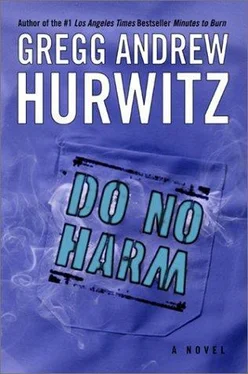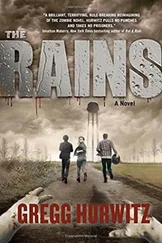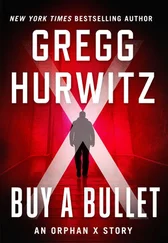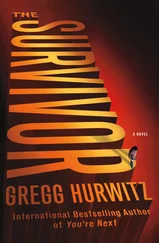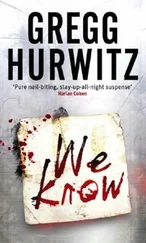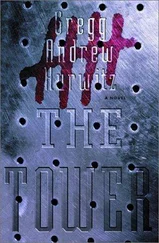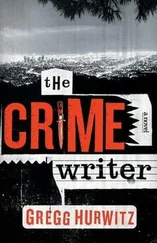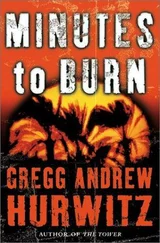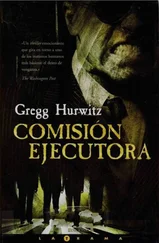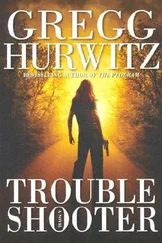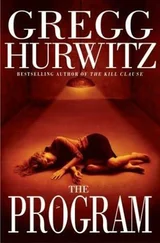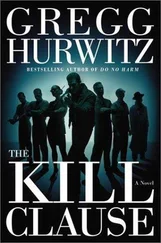Gregg Hurwitz - Do No Harm
Здесь есть возможность читать онлайн «Gregg Hurwitz - Do No Harm» весь текст электронной книги совершенно бесплатно (целиком полную версию без сокращений). В некоторых случаях можно слушать аудио, скачать через торрент в формате fb2 и присутствует краткое содержание. Жанр: Триллер, на английском языке. Описание произведения, (предисловие) а так же отзывы посетителей доступны на портале библиотеки ЛибКат.
- Название:Do No Harm
- Автор:
- Жанр:
- Год:неизвестен
- ISBN:нет данных
- Рейтинг книги:4 / 5. Голосов: 2
-
Избранное:Добавить в избранное
- Отзывы:
-
Ваша оценка:
- 80
- 1
- 2
- 3
- 4
- 5
Do No Harm: краткое содержание, описание и аннотация
Предлагаем к чтению аннотацию, описание, краткое содержание или предисловие (зависит от того, что написал сам автор книги «Do No Harm»). Если вы не нашли необходимую информацию о книге — напишите в комментариях, мы постараемся отыскать её.
Do No Harm — читать онлайн бесплатно полную книгу (весь текст) целиком
Ниже представлен текст книги, разбитый по страницам. Система сохранения места последней прочитанной страницы, позволяет с удобством читать онлайн бесплатно книгу «Do No Harm», без необходимости каждый раз заново искать на чём Вы остановились. Поставьте закладку, и сможете в любой момент перейти на страницу, на которой закончили чтение.
Интервал:
Закладка:
Remembering Dr. Connolly's kindly blue eyes and his well-trimmed white beard, David could not recast him as the perpetrator of these experiments. But his mother had told David cautionary tales about Dr. Connolly, who had deteriorated in his later years beneath the burden of tongue cancer and a rapidly diminishing reputation. He'd become reclusive, holing up in his house. For the last three years of his life, the professional community heard from him only in the form of his letters to psychology and psychiatry journals, angry diatribes decrying the work of more-renowned rivals.
David's mother, he recalled, had gone to great lengths to distance herself from the man. Now he knew why. The study had taken place during his mother's tenure as chief of staff-he was appalled and surprised she had permitted it. When he glanced back at the abstract, he felt the soothing glow of relief. Results were inconclusive, as the study was terminated on October 15, 1973. David's mother had, in fact, stopped the experiments. The paper continued:
However, several of the results are worthy of note, perhaps for incorporation into future studies. We found that once the subjects reached a state of acute distress, they were not easily comforted. In social workshops following the trials, they were permitted to role-play with dolls, interact with nurses, and draw pictures. We noted an increase in hostile behavior following each trial, particularly hostile behavior directed toward the nurses, who carried out the logistics of the experiments and acted as attachment (mother) figures. The subjects seemed to hold the nurses at fault. Those subjects who did not act out their aggression harbored a tremendous amount of latent resentment.
Through each six-week trial period, the subjects tended to develop along one of two distinct routes, either becoming intensely clinging and anxious, or growing increasingly emotionally detached. Those who became detached expressed three central beliefs: (1) The attachment figure would not respond to calls for support and protection, (2) They did not judge themselves to be the sort of person toward whom an attachment figure would respond in caring fashion, and (3) Their actions had no consequences on the external environment.
All three beliefs are reinforced by classic conditioning. As the subjects were rewarded randomly and punished randomly, they came to view themselves as powerless within their environment.
Some intense bonding occurred between subjects during off-hours between trials. When one subject perceived that another could offer comfort or respite from fear, an intense, almost obsessive relationship developed, reminiscent of collective confabulation, the shared fantasy worlds that sometimes develop between castaways and POWs. Through these relationships, the subjects attempted to wrest back some means of control over their lives.
The next few pages had been ripped out. Feeling slightly light-headed, David pushed back in the chair, sending up a miniature cloud of dust, and returned to the filing cabinet. The subsequent alphabetically arranged files were bulky and labeled by name-all males: JOSH ADAMS, TIMOTHY DILLER, FRANK GRANT. David scanned them, his finger coming to rest on the tab reading CLYDE SLADE.
He pulled the file, returned to the desk, and sat staring at it, gathering his courage. Katydids shrilled in the darkness outside the window.
He flipped open the file to reveal a bad Polaroid atop a stack of papers. Clyde, age ten, squinting into a background light. His posture was uncomfortable and defensive-head lowered, shoulders hunched, skinny arms dangling awkwardly at his sides. The points of his shoulders were visible through his threadbare T-shirt. David recognized the dark flat eyes and wide nose, but little else.
The top papers contained Clyde's history, most of which Ed had already told David about. Moved from foster home to orphanage to foster home. Beneath the history were Clyde's clinical results. He had grown increasingly withdrawn throughout the study, the document reported, displaying a fair amount of latent aggression toward the nurses. The experiments had been conducted against Clyde's will; he had begged repeatedly to be left alone, to be permitted to return to his last foster home. His requests were recorded merely as data. He had no parents to lodge more persuasive complaints or to demand that his rights be protected.
The following pages consisted of self-reports, clinical observations, and the results of physiological exams, including a precocious series of skin conductance tests. A few wrinkled drawings remained at the bottom of the stack. Drawn with the fat, simple lines of a coloring book picture, they all featured the same guideline figure: that of a nurse. The nurse's outline was clearly defined, right down to her patronizing smile and white cap. Clyde had used mostly red crayons, turning the simple sketches into gruesome depictions. Vicious slashes colored the nurses' faces, markings pressed so firmly down into the pages they left indentations and even tore the paper in spots. Their heads were covered with layer upon layer of color, until they resembled bloody blurs. Many of the nurses' breasts and genital areas were likewise ravaged with red.
Hurwitz, Gregg
Do No Harm (2002)
A note at the bottom read: Particularly fierce and impassioned. And below that: Film Reel #23.
Dread spreading inside him, David looked up and located the dusty old projector in the corner. The cupboard above the filing cabinets seemed to stare back at him. He opened it to find reel upon reel of sixteen millimeter film, labeled in black marker. He found Reel #23. A screen pulled down from the ceiling in front of the window, unleashing more billows of dust. The light switch clicked off loudly, filling the room with shadows.
David blew the top layer of dust from the projector, plugged it in, mounted the take-up reel, and threaded the film. He pulled a chair around beside the projector and, bracing himself, flipped the switch.
Ten-year-old Clyde Slade, brought into a seclusion room with a timer on the wall. He wears a child's hospital gown. A nurse sits in a chair centered in the small room, staring at the wall like a statue. He goes over to her and takes her hand, but she pulls it away, keeping her stoic stare leveled at the far wall. A loud wavering shriek sounds from hidden speakers, so sudden it startles David back in his chair. On the screen, Clyde begins to cry and attempts to pull himself into the nurse's lap. She moves only to repel him, shoving him off. Clyde sits on the floor, hands pushed over his ears, mouth bent wide, his cries not even audible beneath the shrieking. The noise ends. By the timer on the wall, it takes Clyde over three minutes to cease his frantic sobbing.
And then a loud mechanical voice intones, "Three, two, one. Step back from the door." The loud sound of the door's bolt being unlocked, and Clyde scrambles to freedom.
Clyde's ritualistic phrase, his private mantra, was actually the hard-conditioned cue given to him as a child that his fear was about to end. He used it still to alleviate anxiety.
The film cut out and David wiped the sheen of sweat from his forehead. Seconds later, the seclusion room appeared again on the screen, this time with the lights off.
The outline of the nurse in the chair is barely visible. Clyde is led in, though he pounds at the door as soon as it is closed behind him. "Please! Please!" He runs to the nurse, who again moves only to push him firmly away. The door opens and another nurse enters with a large rectangular box. She opens it and dumps what appear to be harmless garden snakes on the floor. Clyde shrieks and tries to run away but the snakes quickly spread out through the small seclusion room. The second nurse pushes them toward Clyde.
David closed his eyes for a moment, but Clyde's wails still came. "Please! I'll be good." And then: a final terrified strategy- "I'm sorry. I'm sorry."
Читать дальшеИнтервал:
Закладка:
Похожие книги на «Do No Harm»
Представляем Вашему вниманию похожие книги на «Do No Harm» списком для выбора. Мы отобрали схожую по названию и смыслу литературу в надежде предоставить читателям больше вариантов отыскать новые, интересные, ещё непрочитанные произведения.
Обсуждение, отзывы о книге «Do No Harm» и просто собственные мнения читателей. Оставьте ваши комментарии, напишите, что Вы думаете о произведении, его смысле или главных героях. Укажите что конкретно понравилось, а что нет, и почему Вы так считаете.
